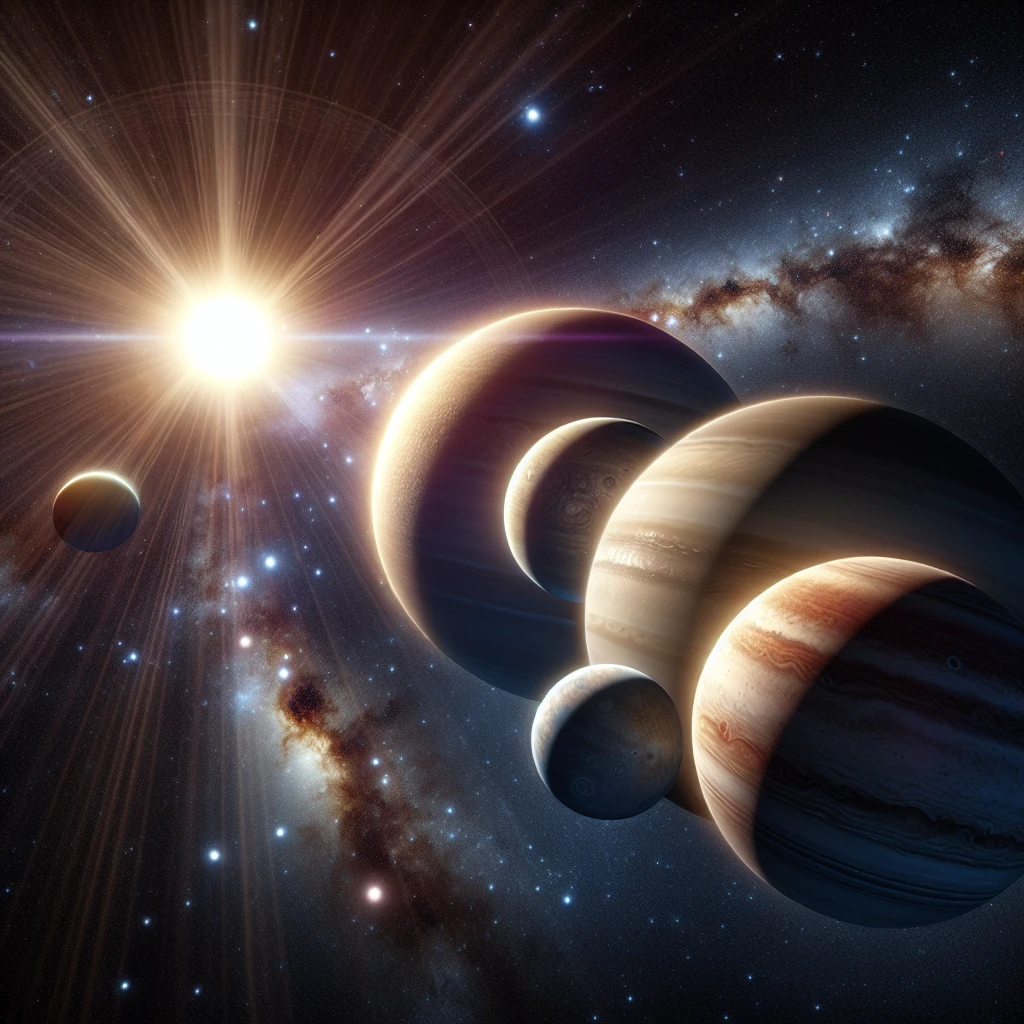Scientists found a special group of planets far away. These planets are all the same size and very old. They have not changed for a very long time. The way they move around their sun is special and can be made into music.
People who study stars and planets are very excited about this. They think these planets can help us learn a lot. We can look at the air around these planets to find signs of life. These planets are bigger than Earth but smaller than a big planet called Neptune.
Scientists think there might be life on planets like these. They want to learn what these planets are made of. They hope to find clues of life on one of these planets. New tools will help them look for life in space. They think they might find life not too far in the future.
Original news source: Perfect solar system’ found in search for alien life (BBC)
Listen
Slow
Normal
Fast
Group or Classroom Activities
Warm-up Activities:
– Charades
Instructions: Divide the class into small groups. Give each group a slip of paper with a word or phrase related to the article (e.g. planets, stars, life, tools). One student from each group will act out the word or phrase without speaking, while the other students in the group try to guess what it is. The group that guesses correctly gets a point.
– Word Association
Instructions: Have the class sit in a circle. Start by saying a word related to the article (e.g. planets). The next student has to say a word that is associated with the previous word (e.g. stars). Continue around the circle, with each student saying a word that is related to the previous word. If a student can’t think of a word, they’re out. The last student remaining wins.
– Vocabulary Pictionary
Instructions: Divide the class into pairs. Give each pair a list of vocabulary words from the article (e.g. planets, life, tools). Student A chooses a word and has to draw a picture to represent it, while Student B tries to guess the word. After a certain amount of time, switch roles. The pair with the most correct guesses wins.
– Speed Summarizing
Instructions: Divide the class into pairs. Give each pair a copy of the article. Student A has one minute to summarize the article to Student B, using their own words. After one minute, Student B has to summarize what they heard to Student A. Encourage students to use simple language and focus on the main points of the article.
– Think-Pair-Share
Instructions: Have the class sit in pairs. Read a question related to the article (e.g. “Why are scientists excited about these planets?”). Give students a few moments to think about their answer, then have them discuss their answers with their partner. After a few minutes, ask a few pairs to share their answers with the class.
Comprehension Questions:
1. What did scientists find far away?
2. Are these planets the same size or different sizes?
3. Have these planets changed for a long time?
4. What can we find by looking at the air around these planets?
5. Are these planets bigger or smaller than Earth?
6. What do scientists think might be on these planets?
7. Will scientists find life on these planets soon or in the future?
Go to answers ⇩
Listen and Fill in the Gaps:
Scientists (1)______ a special group of (2)______ far away. These planets are all the same size and very old. They have not changed for a very long time. The way they move around their sun is special and can be made into music.
People who study stars and planets are very excited about this. They think these planets can (3)______ us (4)______ a lot. We can look at the air around these planets to find signs of life. These planets are bigger than Earth but smaller than a big planet (5)______ (6)______.
Scientists think there might be life on planets like these. They want to learn what these planets are made of. They hope to (7)______ clues of life on one of these planets. New (8)______ will help them look for life in space. They think they might find life not too far in the future.
Go to answers ⇩
Discussion Questions:
Students can ask a partner these questions, or discuss them as a group.
1. What do scientists study?
2. How do scientists feel about the special group of planets they found?
3. How do scientists think these planets can help us?
4. What do scientists hope to find on these planets?
5. Do you think there is life on these planets? Why or why not?
6. Do you like learning about stars and planets? Why or why not?
7. How do scientists want to find signs of life on these planets?
8. How do scientists feel about the new tools that will help them look for life in space?
9. How would you feel if you found signs of life on one of these planets?
10. What do you think these planets are made of?
11. How big are these planets compared to Earth?
12. What do you think the music made from the way these planets move would sound like?
Individual Activities
Vocabulary Meanings:
Match each word to its meaning.
Words:
1. planets
2. size
3. old
4. changed
5. move
6. special
7. life
8. tools
Meanings:
(a) How something goes from one place to another
(b) Living things like plants and animals
(c) Not the same as before, different now
(d) Not new, has been around for a long time
(e) Round things in space that go around a star
(f) Things that help you do a job or task
(g) Different and not like everything else
(h) How big or small something is
Go to answers ⇩
Multiple Choice Questions:
1. What did scientists find far away?
(a) A special group of planets
(b) A new type of star
(c) A big planet called Neptune
(d) A group of aliens
2. What is special about these planets?
(a) They are bigger than Earth and Neptune
(b) They are all the same size and very old
(c) They can’t be seen from Earth
(d) They are made of music
3. What can scientists learn from these planets?
(a) Nothing
(b) A lot
(c) Only a little bit
(d) Everything
4. What can scientists find by looking at the air around these planets?
(a) Signs of water
(b) Signs of music
(c) Signs of aliens
(d) Signs of life
5. How big are these planets compared to Earth?
(a) Smaller
(b) The same size
(c) Bigger
(d) They are made of music
6. What do scientists hope to find on one of these planets?
(a) Clues of water
(b) Clues of music
(c) Clues of aliens
(d) Clues of life
7. What will help scientists look for life in space?
(a) Old tools
(b) No tools
(c) New tools
(d) A telescope
8. When do scientists think they might find life?
(a) Not too far in the future
(b) Never
(c) In the past
(d) Right now
Go to answers ⇩
True or False Questions:
1. The way these planets move around their sun can be turned into music.
2. People who study stars and planets are very apathetic about these planets.
3. These planets have not changed for a long time.
4. Scientists believe that these planets can teach us a lot.
5. Scientists think there might be life on these planets.
6. Scientists discovered a group of planets that are all different sizes and very new.
7. New tools will hinder scientists from searching for signs of life on these planets.
8. These planets are smaller than Earth but bigger than Neptune.
Go to answers ⇩
Write a Summary:
Write a summary of this news article in two sentences.
Check your writing now with the best free AI for English writing!
Writing Questions:
Answer the following questions. Write as much as you can for each answer.
Check your answers with our free English writing assistant!
1. What did scientists find far away?
2. Are these planets all the same size?
3. What can be made into music?
4. Why are people who study stars and planets excited about these planets?
5. What are scientists hoping to find on one of these planets?
Answers
Comprehension Question Answers:
1. What did scientists find far away?
Scientists found a special group of planets far away.
2. Are these planets the same size or different sizes?
These planets are all the same size.
3. Have these planets changed for a long time?
No, these planets have not changed for a very long time.
4. What can we find by looking at the air around these planets?
We can find signs of life by looking at the air around these planets.
5. Are these planets bigger or smaller than Earth?
These planets are bigger than Earth.
6. What do scientists think might be on these planets?
Scientists think there might be life on these planets.
7. Will scientists find life on these planets soon or in the future?
Scientists think they might find life not too far in the future.
Go back to questions ⇧
Listen and Fill in the Gaps Answers:
(1) found
(2) planets
(3) help
(4) learn
(5) called
(6) Neptune
(7) find
(8) tools
Go back to questions ⇧
Vocabulary Meanings Answers:
1. planets
Answer: (e) Round things in space that go around a star
2. size
Answer: (h) How big or small something is
3. old
Answer: (d) Not new, has been around for a long time
4. changed
Answer: (c) Not the same as before, different now
5. move
Answer: (a) How something goes from one place to another
6. special
Answer: (g) Different and not like everything else
7. life
Answer: (b) Living things like plants and animals
8. tools
Answer: (f) Things that help you do a job or task
Go back to questions ⇧
Multiple Choice Answers:
1. What did scientists find far away?
Answer: (a) A special group of planets
2. What is special about these planets?
Answer: (b) They are all the same size and very old
3. What can scientists learn from these planets?
Answer: (b) A lot
4. What can scientists find by looking at the air around these planets?
Answer: (d) Signs of life
5. How big are these planets compared to Earth?
Answer: (c) Bigger
6. What do scientists hope to find on one of these planets?
Answer: (d) Clues of life
7. What will help scientists look for life in space?
Answer: (c) New tools
8. When do scientists think they might find life?
Answer: (a) Not too far in the future
Go back to questions ⇧
True or False Answers:
1. The way these planets move around their sun can be turned into music. (Answer: True)
2. People who study stars and planets are very apathetic about these planets. (Answer: False)
3. These planets have not changed for a long time. (Answer: True)
4. Scientists believe that these planets can teach us a lot. (Answer: True)
5. Scientists think there might be life on these planets. (Answer: True)
6. Scientists discovered a group of planets that are all different sizes and very new. (Answer: False)
7. New tools will hinder scientists from searching for signs of life on these planets. (Answer: False)
8. These planets are smaller than Earth but bigger than Neptune. (Answer: False)
Go back to questions ⇧













